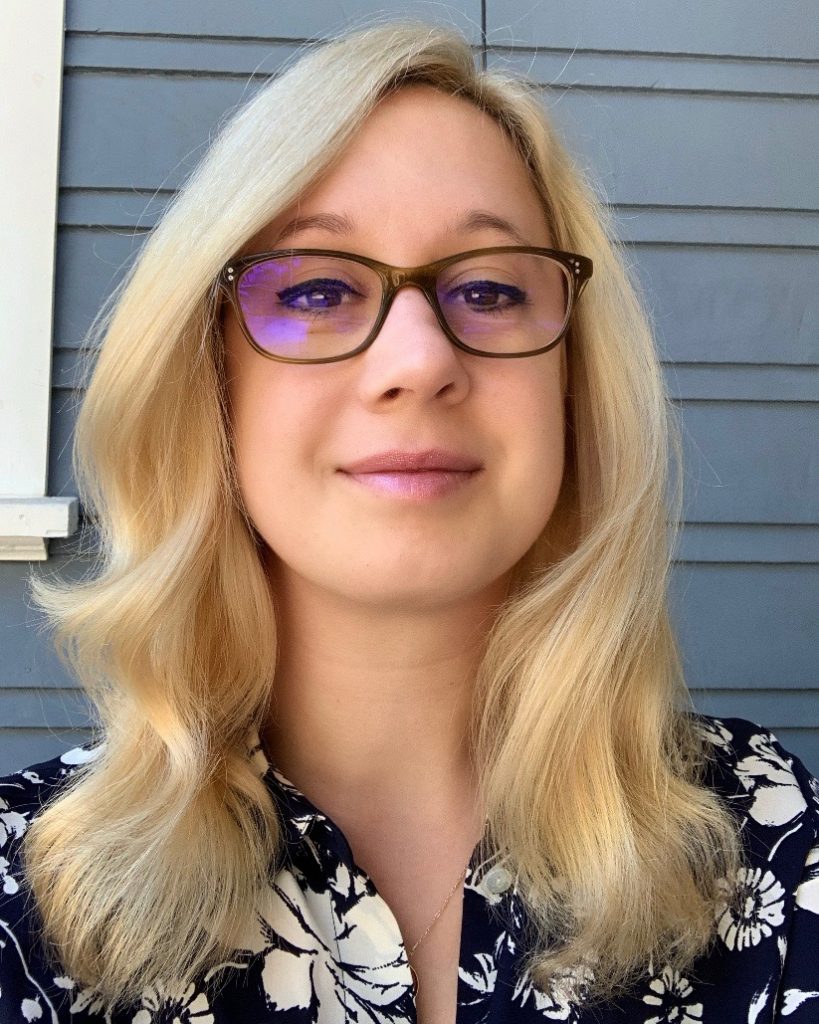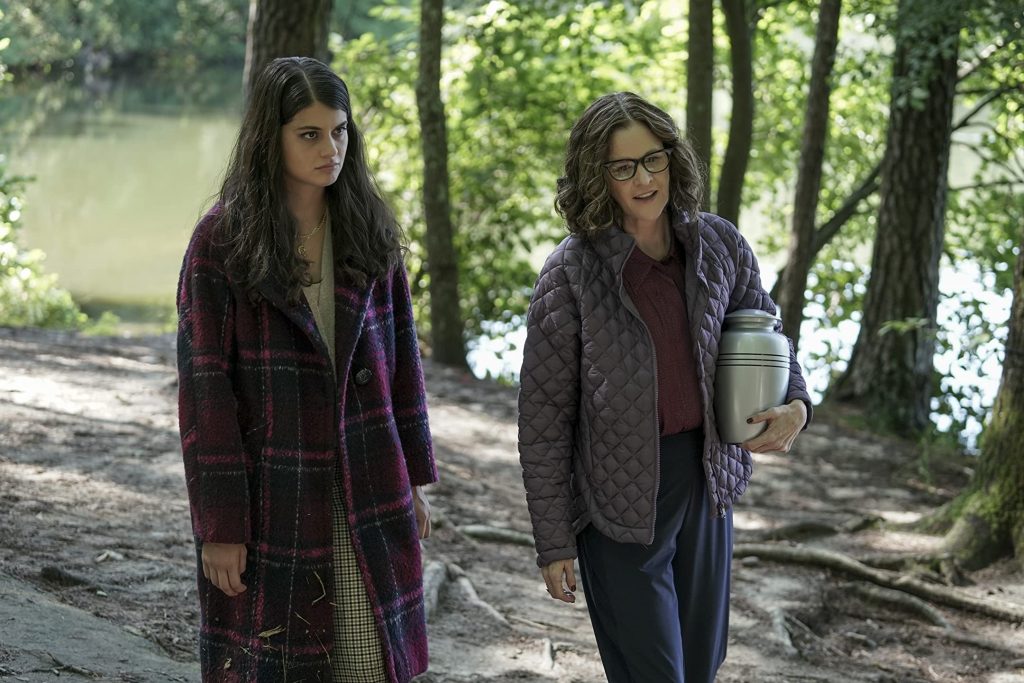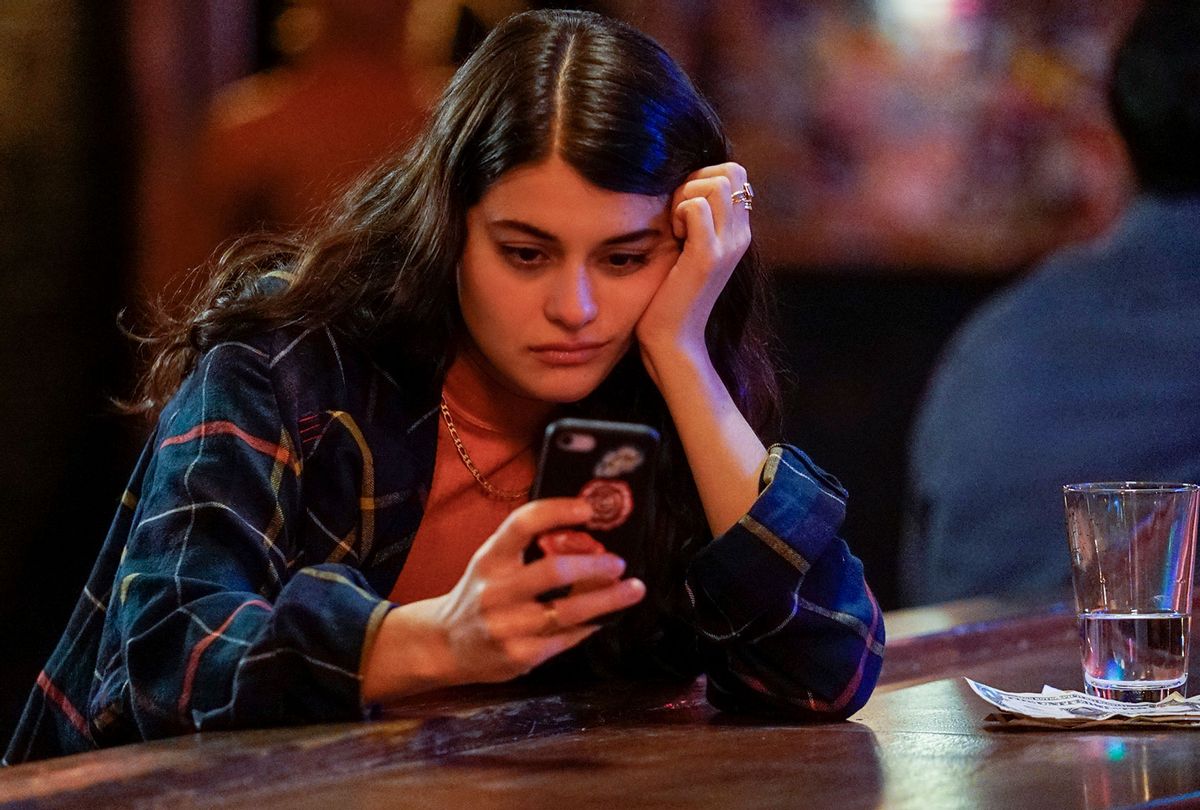Simone Finch – Samantha Fink. The creator and executive producer shares more than just name similarity with her lead character in Single Drunk Female. Based on her own journey to sobriety, the show follows a young woman (Sam Fink) forced to move back home in order to avoid jail time after public intoxication and a drunken run-in with the law. Raw and darkly humorous, the series stars Sophia Black-D’Elia as Sam, Rebecca Henderson as her sponsor Olivia, and Ally Sheedy as Sam’s overbearing mother Carol.
Finch, who has worked as a showrunner’s assistant on Madam Secretary, Roseanne and The Conners, spoke with me about bringing her deeply personal story to the small screen and the realities of addiction and recovery that she wanted her show to embody.
.
How challenging was it to revisit your personal story in the creation of Sam and this TV series?
At times it can be really hard… there were moments where I would share something personal in the writers’ room and everyone would say “That’s great! Let’s put it in”. Brene Brown talks about “vulnerability hangovers” (feelings of shame and fear that can often follow the undertaking of an emotional risk) and I’ve definitely had a few of those with this show. Also if I start dating someone and they watch my show, I think, “Oh God, they know a lot about me now”.
But I wanted an honest portrayal of a female addict. That is my goal. And not just about addiction, but about sobriety and how to maintain that sobriety. I think it’s worth it, but I acknowledge that it hasn’t always been easy.
What is a “drunkalogue” and why did you want to avoid it?
A drunkalogue is where you just share about all of your drunken exploits. As interesting and as funny as they can be, that’s not really the point as far as I’m concerned. I think a lot of shows have gotten off on the trauma of addiction a bit and I wanted to steer clear of that.
Not that those stories don’t affect an addict or an alcoholic… they certainly do, and I think we touch on that part of it. I mean, she hits a bus in the pilot! But that action has real consequences, it’s not just for the sake of “hey look, that’s so funny!” I feel like a lot of addiction and alcoholism is still portrayed quite cavalierly and I didn’t want to do that.

Simone Finch
What does Sophia bring to this role that you’ve both lived and written?
I think Sophia brings a “present-ness” to it that I’ve lived. I’ve been sober almost nine years – it will be on April 8th, god willing.
I think she brings a “how did you feel in this moment?” kind of perspective and it makes me think back to that time. But I’ll admit that sometimes I can’t remember that desperation now. Which is sort of a gift of sobriety. So I think she brings that to the role in a way that I sometimes can’t anymore. It’s pretty cool.
Tell me about the other characters – are they based in reality as well?
Brit is definitely based on a friend of mine that doesn’t speak to me anymore. My alcoholism was damaging and it damaged people and it’s just something I’ve had to deal with.
But I realized I’ve never seen this kind of friendship written about. Especially among women. I think that, unfortunately, we are often put in the place of caretakers. We’re put in this role and so I never saw that dynamic on television before
Felicia is based on a bunch of girls that I grew up with. I grew up in Boston, with lots of Irish Catholic ladies that could just drink me under the table… and not be alcoholics! I was jealous of them. I wanted to be them, but unfortunately it didn’t work out for me.
Carol’s obviously based on my mother, who says the best things in the show are me and the worst things in the show are Ally Sheedy. So “check” with that one!
Joel is based on a real person that I fell in love with, a guy that I worked with at Legal Seafoods. And I think everyone else is kind of an amalgamation of different people in my life, but those are the main players.
The conversations between Sam and Olivia, her sponsor, are powerful. And often relatable to anyone going through a journey of self-discovery.
Olivia is the best sponsor. I have an amazing sponsor today, who is really kind and lovely… but she can also be really tough. Which I need, because when everything’s going well, it’s not a challenge. But I’ve had some rough moments; just because you get sober doesn’t mean life doesn’t continue happening.
I think that Olivia brings a kind of reality to the situation, and some levity. She’s a really good guide for Samantha. She’s definitely one of my favorite characters.
Did you have a different perspective going into Season 2, now that the first season (and perhaps some of the associated anxiety) was under your belt? Where did you want to take the story?
I wanted to show that, again, just because you’re sober doesn’t mean life doesn’t happen. “Life on life’s terms” is what we say in the room. I think that it’s important to show that just because an addict put down the bottle, it doesn’t mean there aren’t other things they can pick up. I’ve certainly done everything but drink. I had never seen that done before either, this idea of “addiction doesn’t just die because you put the plug in the jug”. It’s a way of thinking, it’s a way of acting, and it’s a way of behaving.
I think that’s how I came into Season 2. The overwhelming support and love of the show is unbelievable, and I didn’t expect it, to be honest. I’m a true alcoholic. I thought “This is going to fail, it’s going to be horrible”. That’s where my mind goes. My manager said “It’s not” and she was right.
So it’s just been amazing. I hope people respond to the season as well. It’s not as “straightforward”, in the sense that it’s not necessarily about alcohol as much; but addiction is a full-time deal. They say that while you’re sober, your addiction’s doing pushups in the parking lot. I love that idea. And I think you always have to have a healthy fear. Sometimes you don’t have a healthy fear, and that’s when things can go wrong.

Samantha Fink (Sofia Black-D’Elia) & Carol Fink (Ally Sheedy)
Photo by Danny Delgado/ Freeform
You started in the industry as a stand-up comedian. How, if at all, did that prepare you for a career in screenwriting? What kind of adjustment was it to not have that immediate reaction from your audience?
Stand-up taught me how to write and how to react when an actor or the crew doesn’t respond to a joke. I actually learned this from Roseanne: if the crew doesn’t laugh at a joke, that’s a problem. There is something true to that, because they’re here every day. So I want to make them laugh, even more than the audience a little bit, because if they laugh, it means it’s a really good joke. And if they don’t laugh, you’re like, “Oh god”. So stand-up is amazing. I was still drinking when I was doing it, and I haven’t done it sober. I should try it again.
What else have you picked up along the way, through your work as both a showrunner and showrunner’s assistant?
I’ve worked for some of the best in the business. I worked for Barbara Hall on Madam Secretary and for Bruce Helford on Roseanne and The Conners. I learned about how to deal with actors, how to rewrite a script…if something isn’t working, why not? Figuring out, with or without the actor, what’s not working about the scene. How can I fix this problem? How to deal with crews, how to deal with publicity… all of those shows, especially Roseanne, got a lot of publicity. It was a real crash course… I called it “Showrunner Boot Camp”. I like to say that I got my MFA in Drama from Madam Secretary, and my MFA in comedy from The Conners and Roseanne. Frankly, I’m glad I didn’t go to film school because I think this was a much better education than film school could provide. That’s my opinion, and it’s not to knock on film school. But for me, I’m a doer. My therapist says that I’m an experiential learner. I learned through experience and those experiences really helped me a lot.
Tell me about the Single Drunk Female writers’ room.
It’s really funny! And diverse. We have another sober writer in addition to me, and we don’t always agree on things. Which I think is actually really important. Debate is good. But we work well together. This year was perhaps a little darker, but the jokes were also a little funnier. I love the room and I think they did a fantastic job.
Have you seen a shift in the industry where it’s now more open to telling of these deeply personal stories? Would this project have been as well received even 10 years ago?
Yes, I first started trying to sell in 2016. And this was before MeToo. A lot of people were like, “Oh, I don’t want to see a young female addict… this is depressing”. I thought, “wait a minute…there are so many white dudes and you’re fine with that”.
I love confessional poetry. Like Sylvia Plath and Robert Hull. That’s what we’re having in television right now. I think personal stories have always been told, but if you had asked me these questions before, I would have deflected more and thought, “What’s the point?”. I also think authenticity is more valued today, and that’s really cool. It is something to be valued and to be lauded.
What advice would you give other writers?
Writing is rewriting. I did a hundred drafts of the pilot… at least. And it did get made. But I didn’t give up. I kept knowing I believed in it. And I do think that if you believe in something so strongly, it can happen; but if you have any doubts about your own self, you need to look at that and get better at whatever that is.

